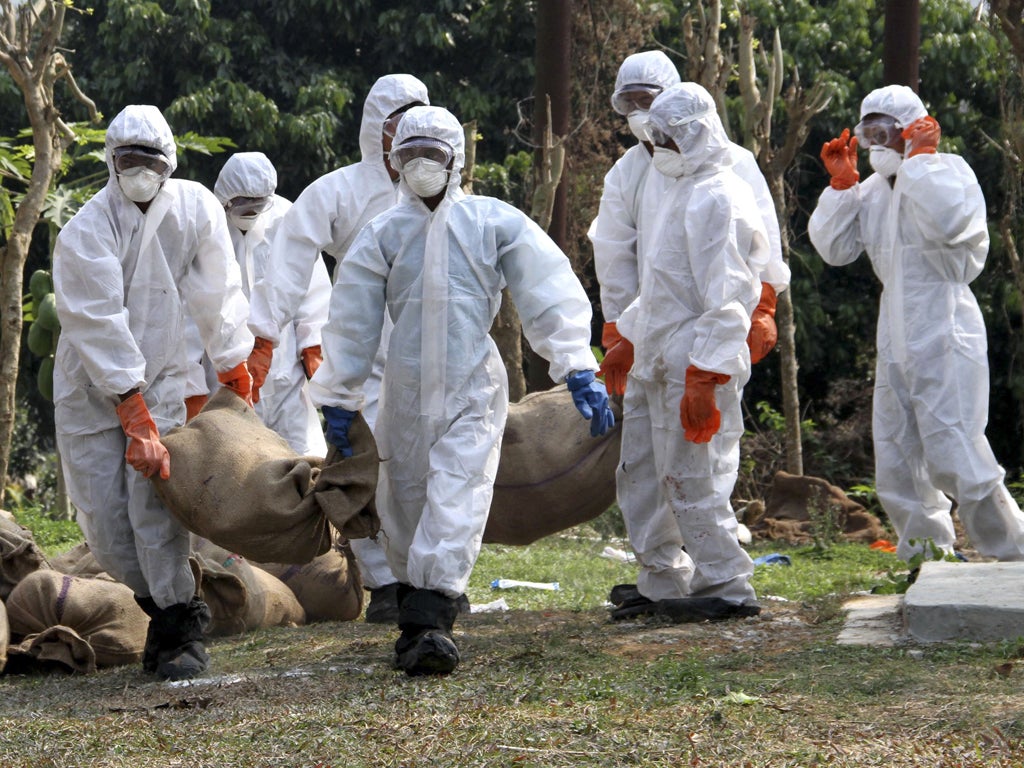Leading scientists urge President Obama's advisers to investigate ethical issues raised by creating highly infectious strain of bird-flu
Virus could easily be transmitted between people

A group of leading scientists has urged President Obama’s advisers to investigate the ethical issues raised by a decision to create a highly infectious strain of bird-flu virus that could be transmitted easily between people.
The scientists, who include a former UK Government chief scientist and a Nobel laureate, said that it is “morally and ethically wrong” to create a new type of influenza virus in the laboratory that is more lethal and transmissible than what actually exists in nature.
Two teams of flu researchers – led by Ron Fouchier of the Erasmus Medical Centre in Rotterdam and Yoshihiro Kawaoka of the University of Wisconsin-Madison – announced in 2011 that they had succeeded in mutating the H5N1 avian virus so that it could in theory be transmitted through the air between people.
They stopped the research last year as part of a wider voluntary moratorium following public outrage over the work. But they announced an end to the moratorium earlier this year, and even an expansion into new areas involving other viruses and diseases.
In a strongly-worded letter sent to the US Presidential Commission for the Study of Bioethical Issues, opponents of the research warned that there has not been enough debate over the threats posed by lifting the moratorium on increasing the transmissibility of highly lethal viruses such as the H5N1 strain of bird-flu.
They said that the 60 per cent mortality rate of the H5N1 virus – on the relatively rare occasions that it has infected humans – puts it in a “class of its own” and that attempting to make it more transmissible through laboratory experiments is tantamount to risking a devastatingly deadly flu pandemic.
“The accidental release of an artificial, laboratory-generated, human-transmissible H5N1 virus into the community has the potential to cause a global pandemic of epic proportions that would dwarf the 1918 Spanish flu pandemic that killed over 50 million people,” the scientists said.
“A majority [of life scientists] considers the creation in the laboratory of a pathogen more lethal than exists in nature is morally and ethically wrong. Indeed, a majority are of the opinion that there is no scientific justification that outweighs the moral and ethical problems,” they said.
The letter, sent at the end of last week, was organised by the Foundation for Vaccine Research, a private organisation based in Washington campaigning for better vaccines. It was sent to the Presidential Commission in order to bypass the powerful US National Institutes of Health, which has funded both research projects into H5N1 transmissibility and has controlled much of the debate over the issue.
Among the 17 signatories of the letter are Professor Lord May, a former chief scientist to the Prime Minister and an expert on disease transmission, Professor Marc Lipsitch, a communicable disease expert at Harvard University, and Sir Richard Roberts, who won the 1993 Nobel Prize in Physiology or Medicine for his pioneering work in genetics.
Other signatories include Professor Robin Weiss, a distinguished British virologist working on HIV, Professor Michael Lederman of Case Western Reserve University in Cleveland, Ohio, and Joshua Plotkin of the University of Pennsylvania.
The scientists are particularly concerned that attempts of create more lethal forms of H5N1 in an attempt to study the threat posed to humans are just the start of further work on other potentially lethal viruses in what they term “gain of function” studies – where more lethal viral mutations are actively encouraged.
“The H5N1 studies represent the first of no doubt many such studies involving other potential pandemic pathogens. Gain-of-function studies with H5N1 virus are being conducted in China, and a team in The Netherlands is expanding their H5N1 studies to include studies with the H7N7 virus, and has announced plans to conduct similar gain-of-function studies with the SARS coronavirus,” the scientists said.
“Just ten days ago we learned that a team in Germany has conducted experiments to see what it would take for canine distemper virus to be transmitted from dogs to humans,” they said.
Professor Simon Wain-Hobson, an eminent virologist at the Pasteur Institute in Paris who was first to sign the letter, said that the WHO has essentially failed to take the lead by widening the ethical debate over an area of contentious research that has been controlled by vested interests.
“The recent calling off of the moratorium by 40 flu researchers alone – not funders, governments or international bodies – says it all. The flu community simply hasn’t understood that this is a hot-button issue that will not go away,” Professor Wain-Hobson said.
Flu researchers have argued that the laboratory work is necessary in order to study the kind of lethal mutations that could arise in nature, but Professor Wain-Hobson said that the artificial selection of dangerous viruses could result in mutants that would be very unlikely to ever exist in nature. He cites the example of the artificial selection of canine genes by dog breeders over the centuries. “Would nature have come up with the dachshund,” he asks?
Join our commenting forum
Join thought-provoking conversations, follow other Independent readers and see their replies
Comments
Bookmark popover
Removed from bookmarks